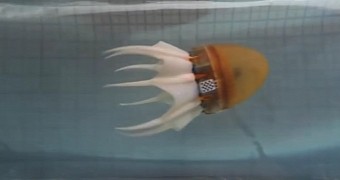Except for some instances like the liquid metal robot in the Terminator 2, most synthetic constructs invented by man, both real and fictional, have been on the rigid and stiff side. However, soft robotics may experience a surge in popularity soon.
We say this because of the certain robot that a team of Greek researchers has just unveiled and that you can watch for yourself in the video embedded below.
The idea was to create a robotic octopus that would be realistic enough for aquatic life to feel comfortable in its presence.
From what we can gather, the experiment has proven to be a success, as small fish apparently found it realistic enough to follow along.
The octopus robot
Currently lacking a name, the contraption has eight arms, complete with silicone tentacles and webbing that successfully emulate the motion of the real thing.
Octopuses have a very interesting means of locomotion, whereby they extend their membranes and tentacles outwards and then quickly contract them, providing propulsion.
The top speed is of seven inches per second (177 mm/s), which is a big improvement over the initial prototype, which achieved only four inches per second (101 mm/s).
It's still leagues away from natural octopuses though, which can lunge forward in bursts of 25 mph / 11 kph.
Not that anyone expected the first robot designs to truly match what is found in nature. Seeing as how we're barely able to get robots to move like we do, we can't expect to do any better with locomotion belonging to other creatures (and, thus, means of movement we have no personal experience with).
Then again, the way an octopus moves is a fair bit less complicated than the string of interrupted falls that walking on solid land constitutes of, and the stronger gravity doesn't help much.
Uses for the octopus robot and future plans
Scientists actually don't think they can use it for much. Sure, they can strap a camera to it and observe marine life without disrupting it, but there's no ETA for that. They may be holding back in anticipation of a better robot.
Also, it's unclear what the control range on such a thing would be and how long a battery will last, so even if they do get the idea off the ground, they might not be able to observe anything more than a few meters below the water surface. A troublesome conundrum, that.

 14 DAY TRIAL //
14 DAY TRIAL // 